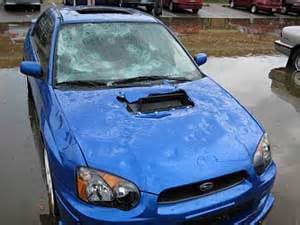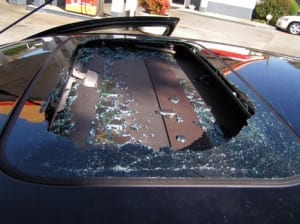A sunroof not only adds style to a car, but also has many benefits. If you have one on your vehicle, you know that it can be an effective way to circulate fresh, cool air into your car. Of course, you can roll down your window for the same effect, but using the sunroof instead doesn’t let as much wind and road noise into your cab. Additionally, during the day, the sun roof brightens up the inside of your car while giving it a roomier feel at the same time, and it’s also great for looking up at the stars when driving on those country roads at night.
Repairs Can Be Costly
In other words, your sunroof is a good investment that adds value to your vehicle. Chances are that it also wasn’t cheap to add this feature, and if it gets damaged, you could end up paying a significant amount of money for repairs. Since today’s sunroofs are motorized and powered by electricity, the various components have a greater chance of being damaged. Furthermore, sunroofs are subject to the same outside sources that can damage your windshield: debris, pebbles and rocks, hail storms, collisions with other vehicles, etc. So the question is, if your sun roof gets damaged, will your insurance cover the costs?
It Depends…
Whether your insurance covers sunroof damage depends on the type of policy you have. If you have comprehensive insurance coverage, your windshield, side windows, and sunroof glass are all covered. However, comprehensive coverage only applies to the glass on your sun roof; the opening and closing mechanism, frame, and tracks will be covered if you are insured for the type of loss that caused the damage. So if your sunroof mechanism gets damaged by accident, you would need to have a policy that has accidental coverage included, or if the glass and components were both damaged from an attempted theft, you would need to have theft coverage in your policy, and so on.
Additional Coverage
Auto insurance policies often have both a comprehensive excess and a collision excess, which means you will need to pay a certain amount out of pocket and insurance will cover the rest. However, you can avoid paying this basic excess if you add additional windscreen coverage. Getting this extra coverage (if the insurance company offers it) means that you won’t have to pay the basic comprehensive excess for damage to your windshield, side windows, or sun roof.
Is It Covered in Your Policy?
Because the sunroof on your car is a relatively expensive feature, it’s important to know whether it’s covered by your insurance policy. If you are unsure about the coverage or what your basic excess is, look through your policy details or contact your insurance agent. Similarly, if you are buying insurance for a recently purchased vehicle, find out the extent of the different levels of coverage relating to sunroofs. Windscreen coverage may be worth it to those wanting to avoid paying the comprehensive excess.
If your sunroof is damaged and you have the adequate coverage, the insurance company will determine the reasonable cost for repair or replacement. And the good news is that if only the glass is damaged, your insurance premium typically won’t increase.











